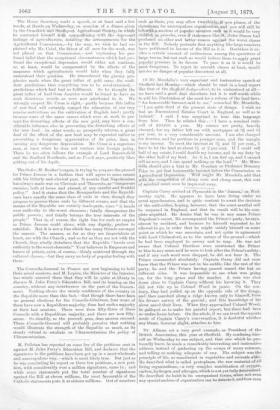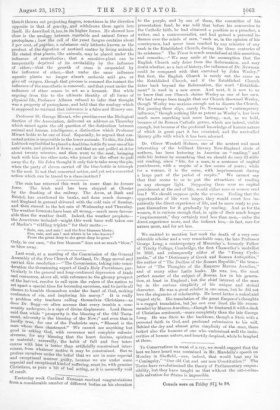Dr. Allman set a very good example, as President of
the British Association, this year at Sheffield. By confining him- self on Wednesday to one subject, and that one which he pro- foundly knew, he made a remarkably interesting and instructive address, instead of gathering up the scraps of many sciences, and telling us nothing adequate of any. His subject was the principle of life, as manifested in vegetables and animals alike. Ho described what is called protoplasm, the raw material of all living organisations,—a very complex combination of oxygen, carbon, hydrogen, and nitrogen, which is not yet fully determined. He described its habit in its unorganised forms, when not even any special nucleus of organisation can be detected., and how even
thenit throws out projecting fingers, sometimes in the direction opposite to that of gravity, and withdraws them again into itself. He described it, too, in its'higher forms. He showed. how 'close is the analogy between vegetable and animal forms of protoplasm ; how the cell of the yeast fungus contains about 2 per cent. of peptine, a substance only hitherto known as the product of the digestion of azotised matter by living animals. He stated that plants, like animals, may be placed under the influence of =esthetics ; that a sensitive-plant can be temporarily deprived of its excitability by the influence of ether,—that the growth of cress is suspended by the influence of ether,—that under the same influence aquatic plants no longer absorb carbonic acid gas, or give off oxygen, though that process is resumed the instant the influence of the anaesthetic is removed ; and that yeast under the influence of ether ceases to act as a ferment. But while arguing from this to the ultimate identity of all forms of physical life, Professor Allman refused to infer that thought was a property of protoplasm, and held that the analogy which is supposed to warrant that inference is a false and illusory one.































 Previous page
Previous page